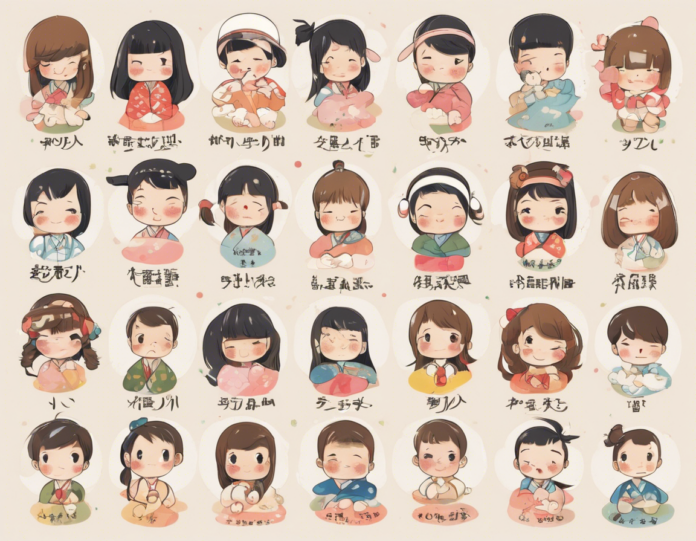Introduction
Choosing a name for a baby is a momentous decision for parents. In recent years, there has been a growing trend towards selecting gender-neutral names. Japanese unisex names are a wonderful way to embrace this trend while also incorporating the beauty and uniqueness of Japanese culture. In this article, we will explore the world of Japanese unisex names, providing a range of options for parents seeking a name that transcends traditional gender norms.
Understanding Japanese Names
In Japanese culture, names hold significant importance and are meticulously chosen to convey meaning, values, and aspirations. Japanese names typically consist of one or two kanji characters, each of which carries its own distinct meaning. While some names are clearly associated with either males or females, there is a rich array of gender-neutral names that can be used for children of any gender.
Popular Unisex Japanese Names
1. Haru
- Meaning: "Spring"
- Kanji: 春
- Notes: Haru is a popular unisex name in Japan, evoking the beauty and rejuvenation of the spring season. It is a gentle and timeless choice for a child of any gender.
2. Ren
- Meaning: "Lotus"
- Kanji: 蓮
- Notes: Ren is a graceful and peaceful name that symbolizes purity and enlightenment. It is equally fitting for both boys and girls, reflecting a sense of harmony and balance.
3. Yuki
- Meaning: "Snow"
- Kanji: 雪
- Notes: Yuki is a poetic name that captures the tranquility and purity of snowfall. As a gender-neutral name, it conveys a sense of wonder and serenity, making it a charming choice for any child.
4. Haruka
- Meaning: "Far Away"
- Kanji: 遙
- Notes: Haruka is a name that conjures images of distant horizons and boundless possibilities. Its gender-neutral nature reflects a sense of adventure and curiosity, ideal for a child with a spirited heart.
5. Sora
- Meaning: "Sky"
- Kanji: 空
- Notes: Sora is a name that encompasses vastness and freedom, much like the open expanse of the sky. It is a gender-neutral name that inspires dreams and imagination, perfect for a child with a bright future ahead.
Unique Unisex Japanese Names
1. Aki
- Meaning: "Autumn"
- Kanji: 秋
- Notes: Aki is a name that resonates with the colors and transitions of autumn. As a gender-neutral name, it reflects both strength and beauty, symbolizing change and resilience.
2. Kai
- Meaning: "Ocean"
- Kanji: 海
- Notes: Kai is a name that embodies the depth and vastness of the ocean. Its gender-neutral quality evokes a sense of mystery and wonder, making it a captivating choice for a child with a free spirit.
3. Hikaru
- Meaning: "Light"
- Kanji: 光
- Notes: Hikaru is a luminous name that illuminates the darkness with its brilliance. As a gender-neutral name, it symbolizes hope and guidance, reflecting a radiant personality and a bright future.
4. Riko
- Meaning: "Child of Truth"
- Kanji: 理子
- Notes: Riko is a name that embodies clarity and honesty, qualities that are highly valued in Japanese culture. Its gender-neutral nature signifies integrity and authenticity, making it a name of great significance.
5. Akira
- Meaning: "Bright" or "Clear"
- Kanji: 明
- Notes: Akira is a name that shines with clarity and brightness, illuminating the path ahead. Its gender-neutral quality conveys wisdom and insight, embodying a spirit of understanding and enlightenment.
Choosing a Name
When selecting a Japanese unisex name for your child, consider the meaning and symbolism behind each option. Think about the qualities you hope your child will embody and the values you wish to instill. Whether you lean towards a name that evokes nature, seasons, elements, or virtues, Japanese unisex names offer a rich tapestry of possibilities for your child's identity.
FAQs
1. Can Japanese names have multiple readings?
- Yes, many Japanese names can have multiple readings depending on the kanji characters used. This versatility allows for a wide variety of meanings and interpretations.
2. Are there Japanese unisex names that are more traditionally masculine or feminine?
- While some names may lean towards traditionally masculine or feminine associations, many Japanese names are inherently gender-neutral and can be used for children of any gender.
3. How can I ensure that a Japanese unisex name is culturally appropriate?
- Researching the meanings and cultural nuances of Japanese names is essential to ensure that your chosen name is both respectful and authentic within the context of Japanese culture.
4. Are there any modern Japanese unisex names that have gained popularity recently?
- Names like Haruto, Kohana, and Yua have become increasingly popular as Japanese unisex names, reflecting a contemporary trend towards gender inclusivity.
5. Can I combine Japanese names to create a unique gender-neutral name?
- Yes, combining kanji characters from different Japanese names is a creative way to craft a unique and gender-neutral name that holds personal significance for your child.
In conclusion, Japanese unisex names offer a blend of tradition, symbolism, and versatility, making them a compelling choice for parents seeking a name that transcends gender norms. By exploring the diverse array of Japanese unisex names available, parents can find a name that resonates with their values and aspirations, creating a timeless and meaningful identity for their child.


Recent comments